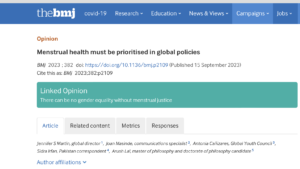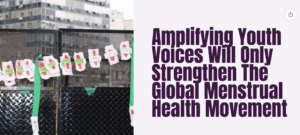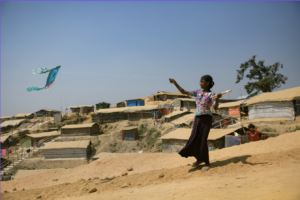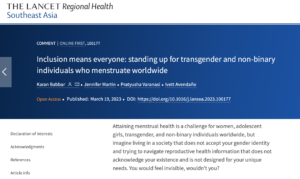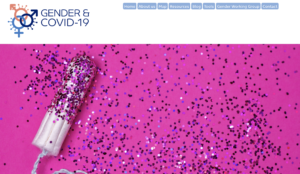In November 2022, Thailand hosted the International Conference on Family Planning (ICFP) which had the theme of Family Planning and Universal Health Coverage (UHC). Since it is first ICFP in Kampala, Uganda, the conference has offered a platform where the global sexual and reproductive health (SRH) movement can advocate for SRH services to be included in UHC plans. Also in 2022, Thailand has also hosted 650 delegates from 520 countries for the Global Summit of Women (GSW), an economic and business forum for women internationally.
These global events have allowed Thailand to make commitments to SRH, offered the opportunity for stakeholders from around the world to meet, and for new actions to emerge.
New actions such as the Prime Minister Prayut Chan-o-cha pledge to promote gender equality during the opening ceremony of GSW, and the Bangkok Metropolitan Administration (BMA), Bangkok Governor Chadchart Sittipunt vowing to support gender equality and emphasize gender diversity education in school curriculums under the Bangkok Metropolitan Administration.
On a macro level, policies within the sphere of social and gender norms seem to be advancing towards a more equitable shift. These also indicate a change in how gende equality and SRH needs are being discussed at the political-level in Thailand. Although connected to life outcomes for women, strong evidence in menstrual health management remains lacking.
Period Poverty in Thailand during 2020 and 2021
Period poverty is identified as a multifaceted issue concerning not only inaccessibility of menstrual products but also access to the spaces and WASH interventions, information and education to manage menstruation in enviroments free of stigm and shame. Previously, period poverty in Thailand has not been widely discussed in the public sphere. This could be due to cultural norms and values that stigmatise the topic, or the fact that other SRH challenges have often been prioritised in policy.
In 2020, the lack of menstrual pads supply in Thai prisons was one of the most pressing issues in period poverty. Nanchanok Wongsamuth reported on Reuters that while serving time in Thai prison, a 42-year-old inmate, Tang, bled through her uniform on the tiled floor when she ran out of menstrual pads. After asking the staff for more pads that morning, she was told to wait on the approval of a supervisor. Tang recalled that the officer made an angry face, asked her why she did not purchase any backups, and said that the prison has limited pads. “I felt so ashamed that I cried”, said Tang according to Wongsamuth.
The Thai law requires the provision of menstrual pads to female inmates free of charge in all prisons, although the amount is not specified. A penology expert at the Department of Corrections overseeing 143 prisons in Thailand, Saovakon Jeadsadaruk, stated that certain prisons lacked the budget. Only 50% – 60% of the total budget requested for purchase of female inmates’ personal items are reportedly allocated according to Jeadsadaruk.
Thailand’s Progress in Period Poverty in 2022
The year 2022 signifies a huge step for menstrual equity in Thailand. Period poverty is for the first time recognized as a challenge to be tackled by Bangkok’s governor Chadchart Sittipunt. The district of Bang Khun Thien in Bangkok now offers free menstrual pads to students in 16 public schools as of May. Poverty is defined by Thai media as the lack of accessibility, beyond merely the lack of financial resources; and is furthermore acknowledged as a structural challenge as well as an intergenerational one. This brings into perspective a deeper understanding for period poverty through the accessibility of menstrual products and how this may be influenced by structural challenges (e.g., policy) and intergenerational challenges (e.g., education).
Thai legal scholar Pedithep Youyuenyong at Chiang Mai University is the leading academic spearheading research surrounding period poverty since 2020; with seminal works such as “The women and girls’ right of access menstrual hygiene products” and “Policy Instruments for Promoting Access of Women and Girls”. This work is crucial to understanding menstrual health needs in Thailand, whilst offering evidence that can inform national policy.
The Bangkok governor included spearheading free menstrual pads in one of the policies underlying improvement to Bangkok’s healthcare. The policy seeks to alleviate period poverty which “affects everyday living and people who menstruate”. Women and adolescent girls who menstruate in Thailand spend a total estimation of 80-150 Thai Baht per month on pads or a total of 20 pads used per month, according to the policy. A cost that is not everyone can afford…
This year, 20,000 menstrual pads are made available in Bang Khun Thien public schools in Bangkok. Thailand is set to welcome next year with more progress towards menstrual equity instore. With amendment to laws surrounding abortion and paid maternity leave, legal advancements in terms of menstrual equity, apart from regional policies in the capital city of Bangkok, are anticipated in 2023.
Recommendations for Thailand
To further advance menstrual equity in Thailand, the Free Pads Pilot Program should be closely observed and iterated to increase its scalability throughout the region and eventually, nation. The tracking of changes to school and work absenteeism, presenteeism, and other issues pertaining to period poverty in school districts carrying out future Free Pads Pilot Programs should also follow to provide data and metrics in future health and education-related policies. Media coverage on period poverty should maintain an understanding of multifaceted nuances to poverty, school and work attendance, physiological factors, and access to comprehensive SRH education for all residents in Thailand
The current landscape of menstrual hygiene management challenge involves knowledge and awareness on menstruation, WASH (Wash, Sanitation, and Hygiene) infrastructure improvement. Access to safe, affordable and sustainable menstrual products play a role a person’s journey on menstrual health, but they must be accompanied by the aforementioned factors.
Menstrual health can be influenced by one’s community, and social and gender norms on a macro level according to the Menstrual Health and Hygiene (MHH) Framework present in the Advancing Gender Equity by Improving Menstrual Health report and the An Opportunity to Address Menstrual Health and Gender Equity report. Therefore, more needs to be done across Thailand to address the drivers than underpin gender inequality.
The recognition of the effects of mental health and period poverty is a start for Thailand. The significance of intersectionality of gender identities, menstrual health, citizenship status, sustainability, and education should also be recognized in policies pertaining to menstrual equity in the upcoming years.
Thailand has come a long way over the last few years, and we are excited to see menstrual health finally being recognised in the country!


